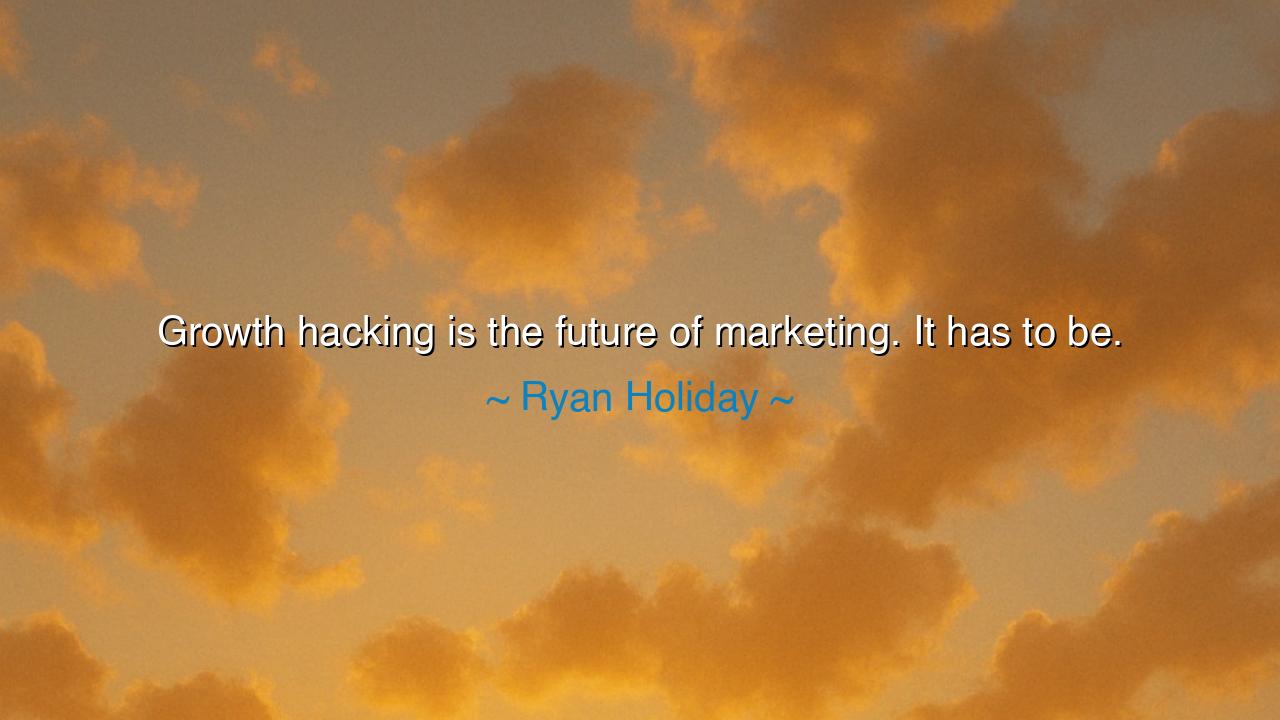
Growth hacking is the future of marketing. It has to be.






"Growth hacking is the future of marketing. It has to be." With these words, Ryan Holiday speaks to a profound truth about the rapidly changing landscape of marketing and business. In a world dominated by technology, innovation, and the constant search for efficiency, traditional marketing strategies are often no longer enough. Growth hacking, which focuses on leveraging creative, unconventional, and highly scalable strategies to achieve rapid growth, is the future—because it speaks to the very essence of adaptation and transformation in the modern era. This approach embraces the idea that in order to succeed in today’s world, we must not only keep pace with change but actively seek out and exploit the hidden opportunities that lie within.
The idea of hacking—in both its original and modern sense—goes back to ancient times when innovators and strategists were constantly seeking to improve their crafts and efforts in new, more efficient ways. Leonardo da Vinci, a figure who straddled the worlds of art, science, and engineering, was essentially a hacker of his time. He approached problems from all angles, using creative methods to solve complex issues in the realms of engineering, anatomy, and aerodynamics. Da Vinci didn’t just follow established practices; he questioned and reinvented methods to achieve results that others thought impossible. This type of creative problem-solving is at the heart of what growth hacking is all about—finding new, unconventional ways to achieve extraordinary results.
In ancient Greece, the concept of innovation and the quest to improve through unconventional thinking were essential to the development of philosophy and science. Figures like Archimedes, whose famous Eureka moment came from applying a simple principle of buoyancy to solve a complex problem, demonstrated the power of thinking outside the box. Archimedes was a pioneer, seeking to solve problems in ways that had never been thought of before. His work laid the foundations for entire fields of study, much like the way growth hackers today aim to redefine what marketing and business growth can look like in an era defined by rapid technological advancement.
Much like the innovations of the Renaissance, growth hacking taps into the spirit of experimentation and creative risk-taking. The Renaissance, a period marked by revolutionary ideas in art, science, and philosophy, was a time of rapid growth driven by new ways of thinking. Niccolò Machiavelli, in his political treatises, understood that in order to succeed, leaders needed to adapt to their environment, thinking strategically about opportunities and resources. Similarly, in today’s business world, growth hackers must see beyond the traditional approaches to marketing and seek out unconventional methods—whether through viral campaigns, digital tools, or social media—that can provide an edge in an ever-changing landscape.
Consider the story of Dropbox, which is a classic example of growth hacking in action. Dropbox, a company that began with a simple idea—a file-sharing service—used a viral referral program to catapult its growth. By incentivizing users to refer others, Dropbox not only expanded its customer base at an exponential rate but also tapped into the power of community and word-of-mouth in a way that traditional advertising could not. This growth wasn’t driven by a huge marketing budget or traditional advertising but by creative, scalable strategies that turned each user into a marketer for the product. This is the essence of growth hacking: finding innovative, scalable ways to achieve extraordinary results.
The lesson in Holiday's words is clear: in today’s world, we must embrace innovation, creativity, and unconventional strategies to achieve success. Traditional marketing methods, while still important, are often not enough to keep pace with the rapid changes in technology and consumer behavior. Growth hacking teaches us that to succeed, we must think differently, be willing to take risks, and embrace new tools and approaches. Just as Leonardo da Vinci reinvented the wheel in his own time, so too must we constantly be willing to challenge the status quo and reinvent how we approach business, marketing, and growth.
In practical terms, we must embrace innovation in all aspects of our personal and professional lives. Experiment with new ideas, use technology to our advantage, and constantly seek out ways to make our efforts more efficient and impactful. Growth hacking is not just a concept for marketers; it is a mindset that can be applied to any area of life. Whether in business, art, or personal development, the future belongs to those who are willing to think creatively, challenge established norms, and embrace the limitless potential of innovation and technology. By adopting this mindset, we can shape a future where success is not just about following the old paths but creating new ones.






AAdministratorAdministrator
Welcome, honored guests. Please leave a comment, we will respond soon